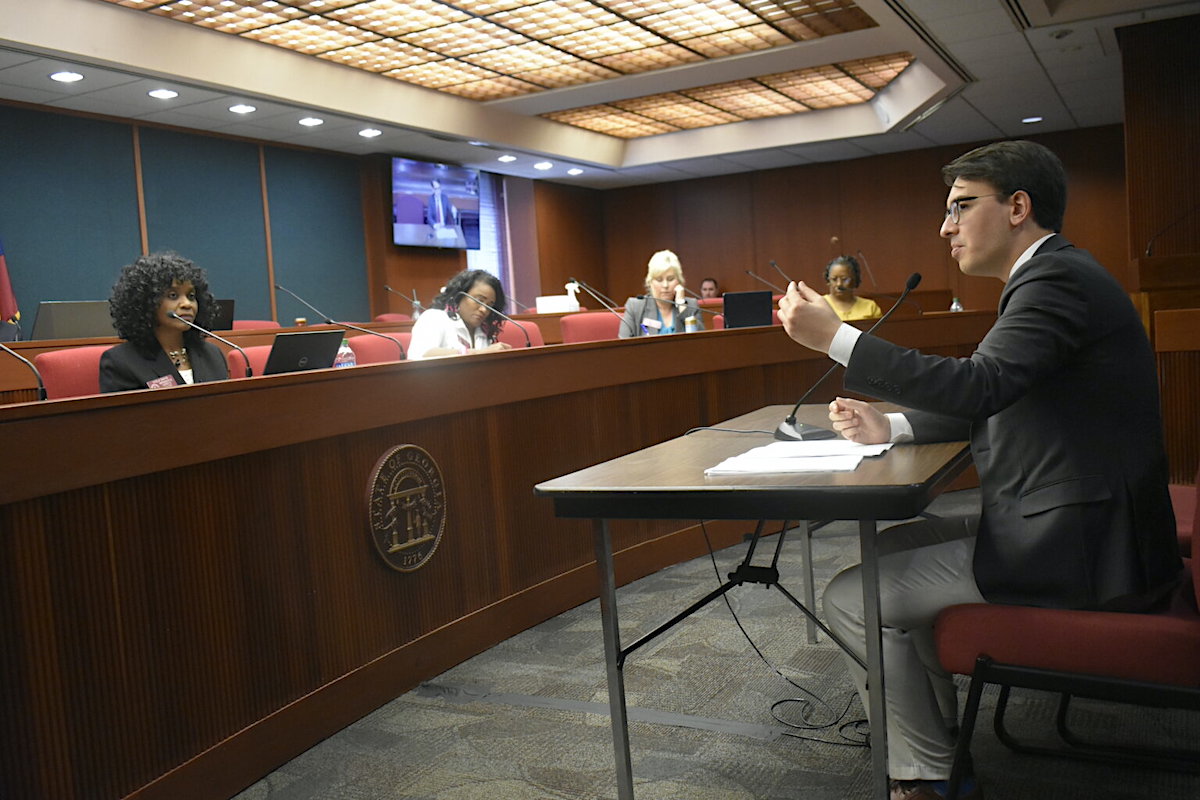
ATLANTA (GA Recorder) — What should be the balance between the free speech rights of large social media companies and those of the people who use their platforms, and should the Georgia Legislature create rules to strike that balance?
That’s what members of the House Science and Technology Committee want to know as they discussed the idea of tech censorship in a hearing Thursday, a follow-up to another meeting on the controversial topic in May. The committee is weighing whether to recommend legislation to the 2022 General Assembly.
The issue is attracting growing attention in recent months after former President Donald Trump and other conservatives have claimed big companies like Facebook, Twitter, and Google censor right-wing speech. Last week, Trump announced a class action lawsuit against those companies and their CEOs after the platforms imposed bans on him and others.
But as social media becomes more and more vital for conducting business and running for office, all Georgians should be interested in making sure the sites do not ban people for political ideas, said Allum Bokhari, a reporter at the right-wing outlet Breitbart and author of “#DELETED: Big Tech’s Battle to Erase the Trump Movement and Steal the Election.”
“Despite the fact that in some cases, people’s entire livelihood can depend on access to a social media platform, small business owners, publishers, and independent content creators currently have essentially no recourse under the law if the content moderator decides to ban them,” Bokhari said. “So you’ve got people who spent entire years of their lives pouring effort and resources and sometimes financial capital into building a presence online, and yet they have no recourse if a big tech company decides to take that all away.”
Bokhari said he favors expanding the approach Google takes with its SafeSearch program that allows users to filter out explicit or violent content. Users should also be able to decide if they want to see questionable political speech or conspiracy theories, he said.
“It just baffles me that they use that kind of technology for obscenity, but filters on so-called disinformation and so-called non-authoritative information, you can’t opt-out of them,” he said.
An attempt to bar social media companies from regulating what posts users see would not pass Constitutional muster — a federal judge recently blocked a Florida law aimed at protecting conservative speech from social media companies on First Amendment grounds.
The First Amendment applies to government censorship and protects the public’s rights to speak, worship, and assemble to protest government action, said Richard T. Griffiths, president emeritus of the Georgia First Amendment Foundation.
“But websites like Twitter or Facebook are private companies, and private companies are not subject to the disciplines of the First Amendment, where anybody can say anything on their platform,” he said. “They have the right, as private entities, to develop rules about what they consider appropriate in their universes.”
Still, there could be other ways for governments to target big tech companies, said Professor Luigi Zingales of the University of Chicago School of Business.
When dealing with a business with users that hurt a third party or create unintended consequences, governments can react with taxes, he said.
“The ad-based business model of social media is a model that produces an enormous set of externalities, from the loss of data privacy to addiction to negative political polarization, so it’s only fair to think about taxation,” he said. “And this is something that can be done at the local level; you (can) tax all the ads that are viewed by people in Georgia. This is being done by Maryland, and this can be done as a measure itself or as pressure to obtain something that, maybe at the state level you cannot obtain, but you care enough to create the pressure to do it at the federal level.”
But regulating successful companies would defy the conservative principles those regulations would be designed to protect, said Carl Szabo, general counsel of NetChoice, an industry group with members that include Amazon, Facebook, Google, TikTok, and Twitter.
“I’m an originalist, and that’s kind of why I feel so strongly about some of the things that we do see online that do raise concerns for me, as a conservative, when I see people being removed, people being, quote-unquote, de-platformed or blackballed or whatever we want to call it today,” he said. “But the other side of me, the originalist, conservative side, says, but that flies in the face of the notion that private businesses can be the arbiters of what is best for their users and their advertisers.”
Szabo pushed back against the idea that platforms are targeting conservative speech, arguing that left-wing content creators complain that their speech is censored as well.
Social media companies do not target specific beliefs, said Jim Halpert, attorney and partner of DLA Piper, who represented NetChoice in a lawsuit against the blocked Florida law. They simply want to make money by creating a welcoming atmosphere for the most users.
“Platforms want users to choose their site over others, and users want to visit sites where they know what they’re going to get, and there is a variety of choices in the marketplace for users who want different things — we can argue about market share, but a lot of this is based on the popularity of the site,” he said.
The work of determining what posts to block is difficult, especially for large sites — on average, 6,000 tweets are sent out every second, according to Internet Live Stats — and censors have to filter out content ranging from the illegal, like child pornography and threats of violence, to the distasteful, like racism or graphic images. In recent months, social media falsehoods about COVID-19 masks and vaccines has led some to worry about the spread of misinformation costing lives.
Messing with the free market could prevent companies from removing these types of posts for fear of breaking the law, Halpert said.
“If you say no moderation of political or religious content, you’re going to see more and more of these bad actors reframe their content as religious or political, add a little element of it, and then put it up online,” he said. “Do you want an internet where plaintiffs’ class action lawyers can shake down social media sites that try to make the sites more courteous or provide better online experiences for their users?”
Acworth Republican Rep. Ed Setzler, who chairs the committee, said he is concerned about reports of Georgians losing their livelihoods over bans from social networking sites, but he said the committee will take its time before writing any legislation.
“We’d do well to take a deep dive and understand, rather than act first and deliberate later,” he said. “There’s a number of states that have been active, some might say wisely, some might say unwisely, others might say wisely but hastily, and there might be opinions in-between. Our goal as the Committee on Science and Technology, as you know, is to take advantage of the out-of-session time we have over the course of the interim, delve deeply into issues, understand issues, help frame issues so that that can inform any efforts that might lead to legislation, or not, as we would contemplate action next legislative session.”







